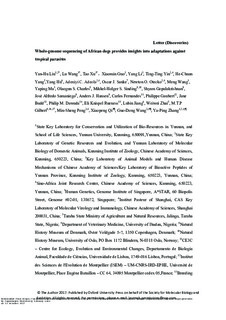Whole-genome sequencing of African dogs provides insights into adaptations against tropical parasites
Liu, Yan-Hu; Wang, Lu; Xu, Tao; Guo, Xiaomin; Li, Yang; Yin, Ting-Ting; Yang, He-Chuan; Hu, Yang; Adeola, Adeniyi C.; Sanke, Oscar J.; Otecko, Newton O.; Wang, Meng; Ma, Yaping; Charles, Olaogun S.; Sinding, Mikkel Holger Strander; Gopalakrishnan, Shyam; Samaniego, José Alfredo; Hansen, Anders J.; Fernandes, Carlos; Gaubert, Philippe; Budd, Jane; Dawuda, Philip M.; Rueness, Eli Knispel; Jiang, Lubin; Zhai, Weiwei; Gilbert, Marcus Thomas Pius; Peng, Min-Sheng; Qi, Xiaopeng; Wang, Guo-Dong; Zhang, Ya-ping
Journal article, Peer reviewed
Accepted version

Åpne
Permanent lenke
http://hdl.handle.net/11250/2485802Utgivelsesdato
2017Metadata
Vis full innførselSamlinger
- Institutt for naturhistorie [1225]
- Publikasjoner fra CRIStin - NTNU [38127]
Sammendrag
Natural selection in domestic dogs is of great interest in evolutionary biology since dogs have migrated to every inhabited continent of the world alongside humans, and adapted to diverse environments. Here, we explored their demographic history and genetic basis of adaptation to the tropical African environment using whole genome analyses of 19 African indigenous dogs from Nigeria. Demographic analysis suggests that the ancestors of these dogs migrated into Africa from Eurasia 14,000 years ago and underwent a severe founder effect before population expansion. Admixture analysis further reveals that African dog genomes contain about 1.88–3.50% introgression from African golden wolves (Canis anthus). Population genetic analysis identifies 50 positively selected genes linked with immunity, angiogenesis, ultraviolet protection, as well as insulin secretion and sensitivity that may contribute to adaptation to tropical conditions. One of the positively selected genes, adhesion G protein-coupled receptor E1 (ADGRE1), has also been found to be association with severe malaria resistance in African human populations. Functional assessments showed that ADGRE1 provides protective host defense against Plasmodium infections. This result, together with the fact that the inflammatory response to canine babesiosis is similar to complicated falciparum malaria in humans, support the dogs as a model for the study of malaria control and treatment.